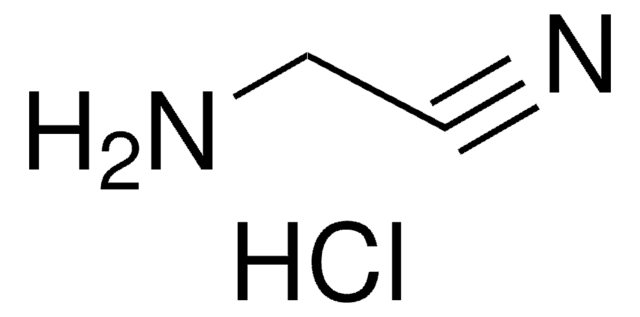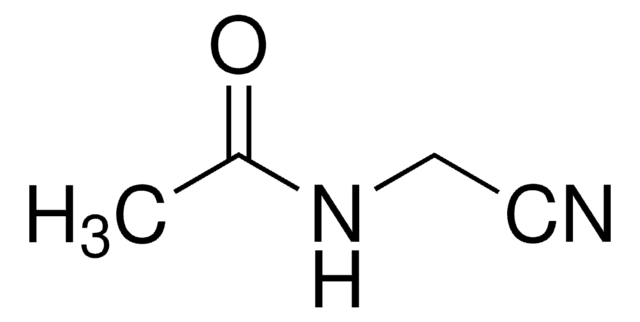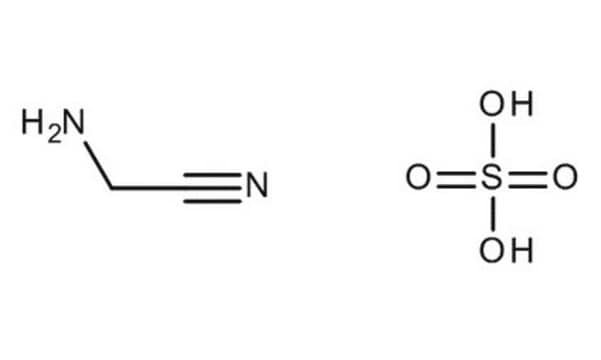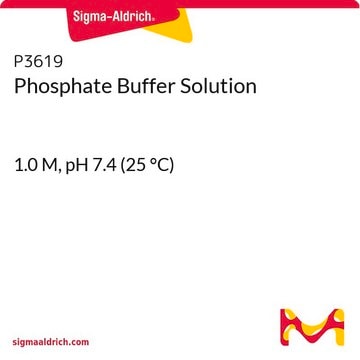All Photos(1)
About This Item
Empirical Formula (Hill Notation):
C3H6N2
Molecular Weight:
70.09
EC Number:
MDL number:
UNSPSC Code:
12352200
PubChem Substance ID:
Recommended Products
form
liquid
SMILES string
NCCC#N
InChI
1S/C3H6N2/c4-2-1-3-5/h1-2,4H2
InChI key
AGSPXMVUFBBBMO-UHFFFAOYSA-N
Other Notes
Please note that Sigma-Aldrich provides this product to early discovery researchers as part of a collection of unique chemicals. Sigma-Aldrich does not collect analytical data for this product. Buyer assumes responsibility to confirm product identity and/or purity. All sales are final.
NOTWITHSTANDING ANY CONTRARY PROVISION CONTAINED IN SIGMA-ALDRICH′S STANDARD TERMS AND CONDITIONS OF SALE OR AN AGREEMENT BETWEEN SIGMA-ALDRICH AND BUYER, SIGMA-ALDRICH SELLS THIS PRODUCT "AS-IS" AND MAKES NO REPRESENTATION OR WARRANTY WHATSOEVER WITH RESPECT TO THIS PRODUCT, INCLUDING ANY (A) WARRANTY OF MERCHANTABILITY; (B) WARRANTY OF FITNESS FOR A PARTICULAR PURPOSE; OR (C) WARRANTY AGAINST INFRINGEMENT OF INTELLECTUAL PROPERTY RIGHTS OF A THIRD PARTY; WHETHER ARISING BY LAW, COURSE OF DEALING, COURSE OF PERFORMANCE, USAGE OF TRADE OR OTHERWISE.
NOTWITHSTANDING ANY CONTRARY PROVISION CONTAINED IN SIGMA-ALDRICH′S STANDARD TERMS AND CONDITIONS OF SALE OR AN AGREEMENT BETWEEN SIGMA-ALDRICH AND BUYER, SIGMA-ALDRICH SELLS THIS PRODUCT "AS-IS" AND MAKES NO REPRESENTATION OR WARRANTY WHATSOEVER WITH RESPECT TO THIS PRODUCT, INCLUDING ANY (A) WARRANTY OF MERCHANTABILITY; (B) WARRANTY OF FITNESS FOR A PARTICULAR PURPOSE; OR (C) WARRANTY AGAINST INFRINGEMENT OF INTELLECTUAL PROPERTY RIGHTS OF A THIRD PARTY; WHETHER ARISING BY LAW, COURSE OF DEALING, COURSE OF PERFORMANCE, USAGE OF TRADE OR OTHERWISE.
Signal Word
Danger
Hazard Statements
Precautionary Statements
Hazard Classifications
Acute Tox. 4 Oral - Eye Dam. 1 - Repr. 2 - Skin Corr. 1C
Storage Class Code
8A - Combustible corrosive hazardous materials
WGK
WGK 3
Flash Point(F)
Not applicable
Flash Point(C)
Not applicable
Certificates of Analysis (COA)
Search for Certificates of Analysis (COA) by entering the products Lot/Batch Number. Lot and Batch Numbers can be found on a product’s label following the words ‘Lot’ or ‘Batch’.
Already Own This Product?
Find documentation for the products that you have recently purchased in the Document Library.
Customers Also Viewed
Brian L Hoh et al.
Journal of the American Heart Association, 7(8) (2018-04-15)
Estrogen deficiency is associated with the development of cerebral aneurysms; however, the mechanism remains unknown. We explored the pathway of cerebral aneurysm development by investigating the potential link between estrogen deficiency and inflammatory factors. First, we established the role of
Taichi Ikedo et al.
World neurosurgery, 129, e361-e366 (2019-06-09)
To investigate the association between vascular morphology and the development of intracranial aneurysms (IAs), the morphological changes of intracranial arteries after IA induction were examined using a rodent model. The vascular morphology of the circle of Willis in rats was
Hirokazu Koseki et al.
Translational stroke research, 11(1), 80-92 (2019-02-10)
Intracranial aneurysm (IA) usually induced at a bifurcation site of intracranial arteries causes a lethal subarachnoid hemorrhage. Currently, IA is considered as a macrophage-mediated inflammatory disease triggered by a high wall shear stress (WSS) on endothelial cells. However, considered the
Haruka Miyata et al.
Journal of neurosurgery, 1-11 (2019-08-17)
Subarachnoid hemorrhage (SAH) has a poor outcome despite modern advancements in medical care. The development of a novel therapeutic strategy to prevent rupture of intracranial aneurysms (IAs) or a novel diagnostic marker to predict rupture-prone lesions is thus mandatory. Therefore
Miyuki Fukuda et al.
Journal of neurosurgery, 1-13 (2019-12-21)
There are no effective therapeutic drugs for cerebral aneurysms, partly because the pathogenesis remains unresolved. Chronic inflammation of the cerebral arterial wall plays an important role in aneurysm formation, but it is not clear what triggers the inflammation. The authors
Our team of scientists has experience in all areas of research including Life Science, Material Science, Chemical Synthesis, Chromatography, Analytical and many others.
Contact Technical Service











